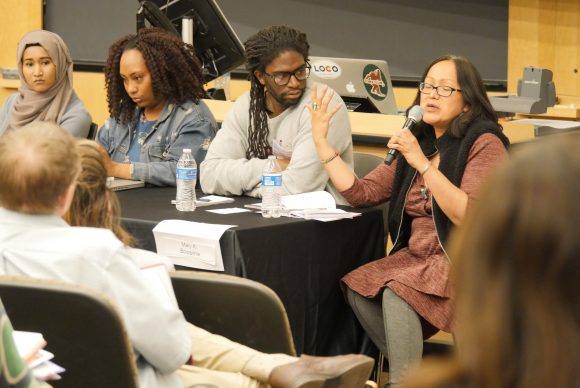
Panelists speak at the “Rights, Wrongs and Responsibilities” conference. Courtesy of Gil Asakawa.
Full disclosure: the CU Independent was invited to have a booth at this conference and a CUI editor spoke on a panel, he had no part in the editing of this article.
The journalism department held a one-day conference on how to fairly report on race issues in the media Saturday. Titled “Rights, Wrongs and Responsibilities: Covering Race in Today’s America,” the conference hosted a variety of professionals in the journalism industry to discuss how race is reported on and how the media can improve.
Mei-Ling McNamara, an assistant professor at CU, organized the conference. She noticed an opportunity to bring together local media makers to discuss the topic of covering race.
“I think that in the discussions, in current events this year, there’s been a real need to step up and provide a space for these kinds of frank and honest discussions around race in the media, and today’s event did that,” McNamara said.
Lee Fang, an investigative journalist at The Intercept, identified in his keynote address titled “Weaponizing Race” that race is often used to drive a wedge between workers. He said he’s particularly interested in looking at how the wealthy use race as a social weapon.
Fang told the audience that in order to understand the current race dynamic, people need to understand dynamics from the past, yet emphasized that large mainstream companies still pour money into racist campaigns. In particular, Fang called the financing of Trump’s 2016 campaign as “targeted, well-financed hate.”
Fang closed with the idea that the Republican party is using racism to distract the Democratic party. He referred to Steve Bannon, who said that the Muslim ban is good because it keeps the Democratic party talking about race.
Another session considered the media’s coverage of intersectionality and race. Panelists discussed how their publications identified coverage of minority groups and their thoughts on media coverage. Tish Beauford, a producer at local radio station KGNU, began the conversation by asking the audience a question: “Where does your inner racist reside?”
She added that everyone has racist tendencies. She told the audience members to reflect on where their inner racists were born and what paths they’d taken to elevate, diminish or evolve it.
An audience member told Beauford that he grew up in a primarily white environment and eventually ended up othering black people because they were not familiar to him. Beauford assured the audience member that that’s usually the response she gets.
Theresa Halsey, a producer at KGNU, addressed issues that Native Americans are facing. She told the audience that it’s important to tell their stories because Native Americans are often misrepresented in the media.
“I like my program specifically because it’s not four minutes long,” Halsey said.
Jackson Barnett, editor-in-chief of the CU Independent, represented the news site and how the publication goes about covering race. After speaking with sources and looking at stats, he said that the staff found that CU has not been the most welcoming to students from different racial backgrounds.
“Our goal is to really be the voice of the students,” Barnett said.
The CU Independent decided that representing students who are not heard on campus is its priority. He pointed out that student media may not break a lot of mainstream stories, but it often breaks stories about race, intersectionality and other things that the mainstream media might overlook.
Beauford brought the panel to a close by telling the audience that in order to make things better, people need to be willing to be uncomfortable and have uncomfortable conversations.
A discussion between Terron Moore, MTV’s TRL senior social media director, and Kwame Holmes, an assistant professor at CU, ended the event. Holmes said that Moore’s job sounds a lot like switching codes because Moore writes and directs social media. He wondered whether that could be helpful for marginalized groups to learn how to do.
Moore said he’s more authentically himself due to his job and that he feels being himself helps him gain more opportunities.
The discussion got more serious when Moore brought up younger generations’ role in the media. He emphasized that young people do care about current events, sharing an example of teenagers discussing net neutrality on Twitter.
“The thing about young people is that they don’t necessarily need brands to tell them what to think,” Moore said.
Moore will be speaking more thoroughly about his experiences and giving tips to students about working in the communication industry at a campus lecture on Wednesday.
Caitlin Mcquade, a Boulder resident, said she wished more people had attended the event and that she found it quite insightful.
“I think that this is a place where some voices are speaking out who don’t normally get heard in the journalism world,” Mcquade said.
Contact CU Independent News Staff Writer Makenna Sturgeon at makenna.sturgeon@colorado.edu.
